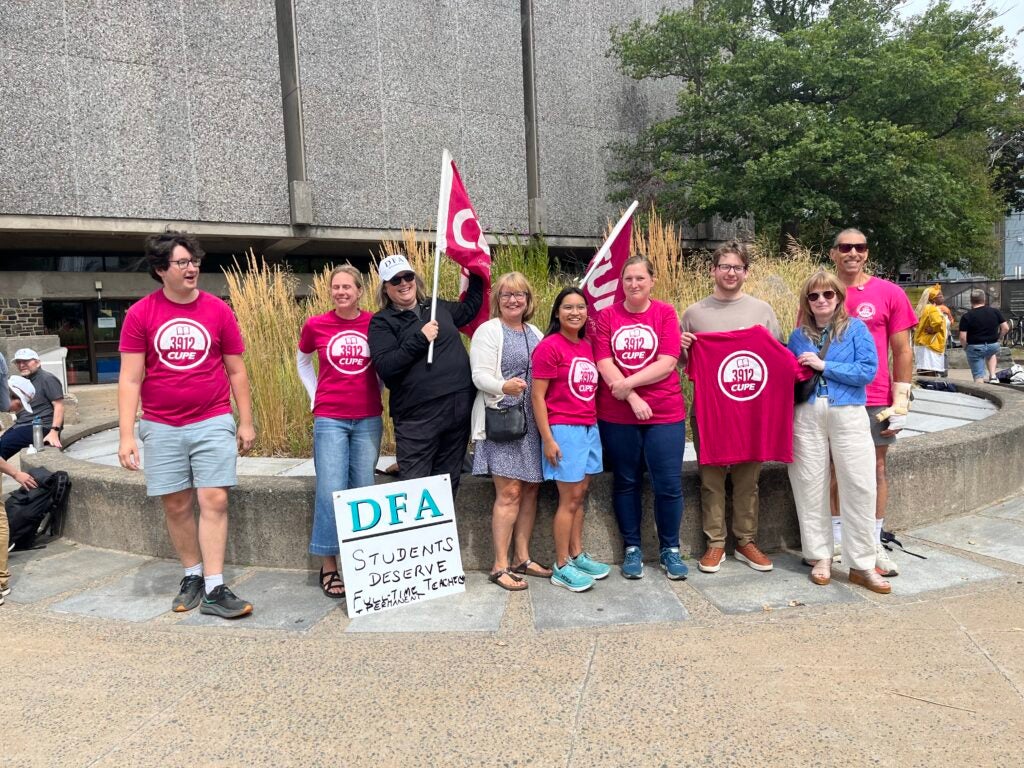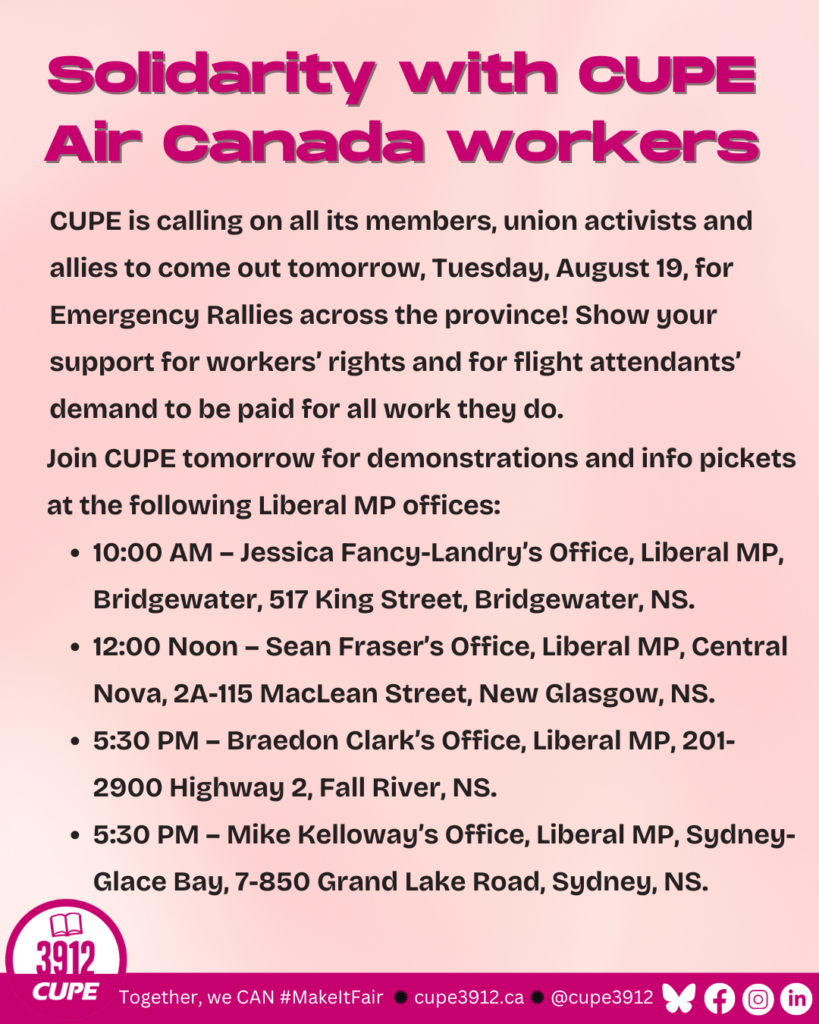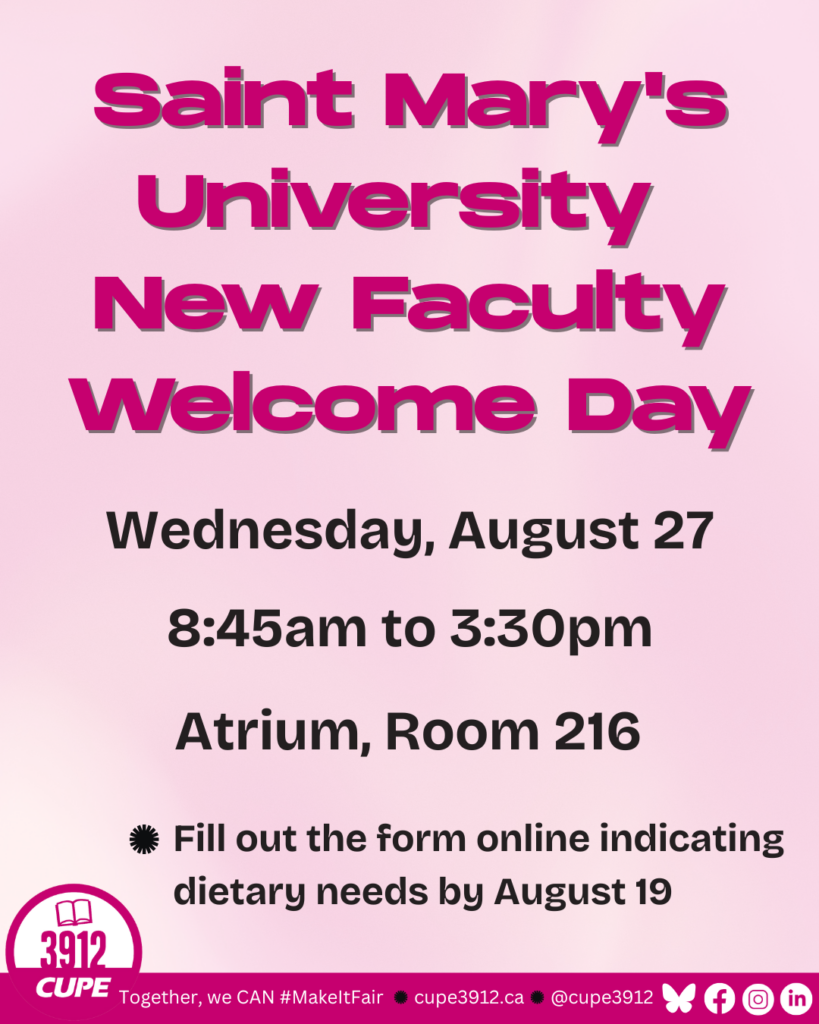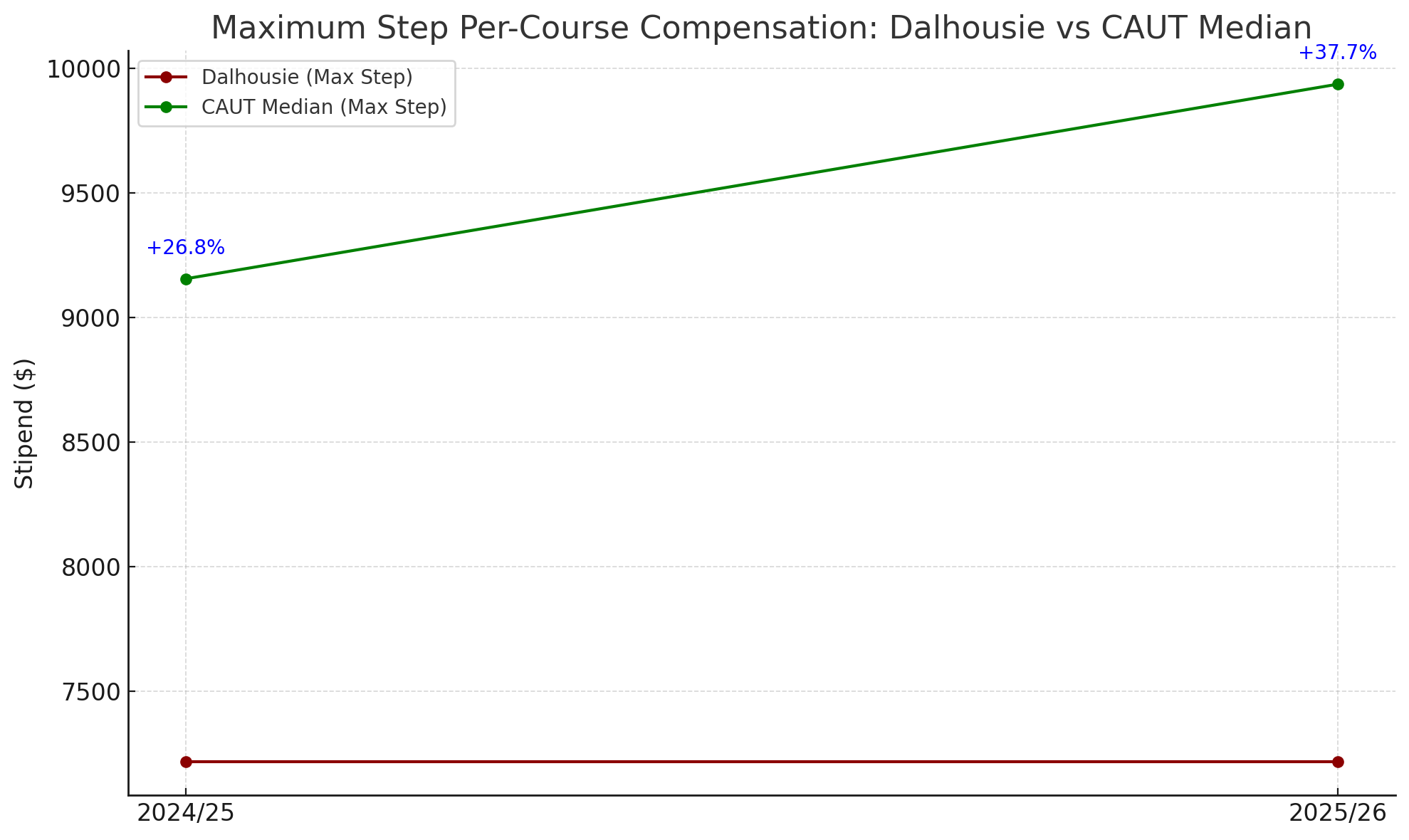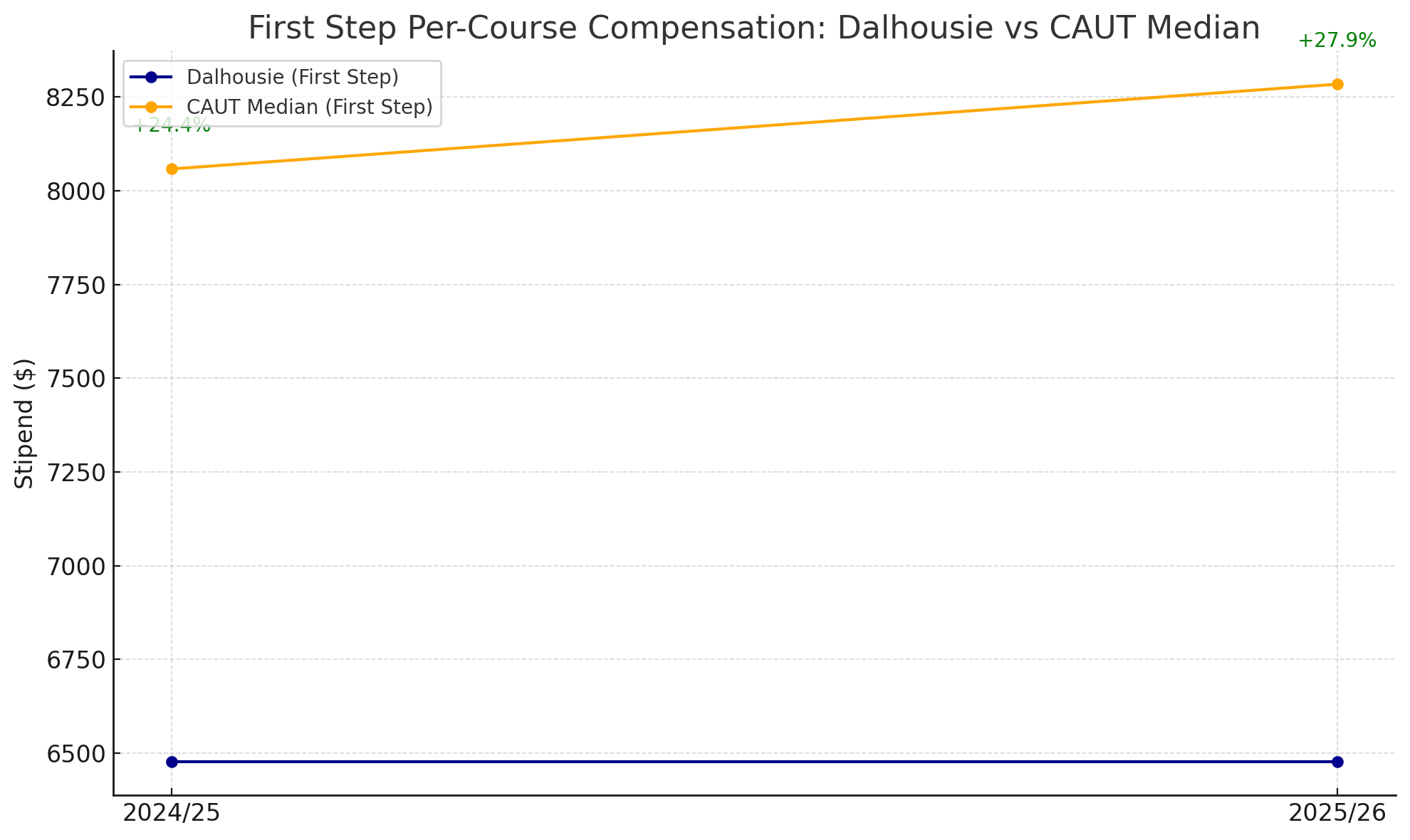Originally posted as COLLECTIVE BARGAINING 101 by Jeff McKeil (Canadian Association of University Teachers) in 2016
2025 Additions by Aiden Farrant
Edited by Sophie J. Boardman
Navigating the different stages of the bargaining process can be challenging, especially for precarious workers like those in Local 3912 who may be used to legislation and procedures from other provincial or international districts. This article is to serve as a primer, highlighting key tasks for the Local’s Negotiating Committee, its volunteer support, and the Employer at crucial stages. We hope it will help you, our Members, engage constructively when you come out to support the Local.
What is Collective Bargaining?
Collective bargaining is a process for identifying and resolving conflicts over the terms and conditions of employment. It is a structured conversation about what academic staff really do, and about how their work should be recognized and compensated.
The process by which the Employer and the Union come to an agreement over terms relating to the workplace, and can include but is not limited to:
- pay rates
- seniority and hiring
- duties of work
- working conditions and safety concerns
- workspaces and job materials
- benefits and pensions
- academic freedoms
- training opportunities
- relationships between Supervisors and Employees
The Bargaining process is prescribed by the Trade Union Act in Nova Scotia, and has been intentionally designed so that what is finally agreed to through the process of good faith bargaining is what the parties themselves agreed to, based on the particular working environment and employment relationship.
The effectiveness of the Local at ensuring the Employer is compelled to offer ‘concessions’, or agree to what the Negotiating Committee proposes, is proportional to its collective organization, which amplifies Members’ voices. Collective Bargaining is fundamentally a power relationship in which each side’s relative power is leveraged at the table to achieve their goals.
How does Collective Bargaining work?
The process generally follows these steps:
In this stage, the Local and the Employer appoint their respective Negotiating Committees. In the Local’s case, this happens at a Unit Meeting (either special or regular annual) where one or two members at large are elected to committee seats, along with the Unit Vice-President. The Local’s President and National Servicing Representative are also included on Negotiating Committees, the latter serving as Chief Negotiator.
The Negotiating Committees then solicit feedback from the Membership about what key bargaining issues are. To ensure and enhance the Union’s collective strength, Negotiating Committees work hard to fairly represent the interests of all its membership and ensure that improved working conditions are being sought for all. Employers will often pit working classifications against each other (for example, Part-Time Faculty against Teaching Assistants), therefore Negotiating Committees must strive to identify unifying issues that can unite these classifications for more effective negotiations.
Member feedback is then crafted into a proposed Collective Agreement (also called “proposals” when described as specific articles of a proposed Collective Agreement). Depending on bargaining timelines, these proposals may be presented to the membership for approval. Often member feedback is received relatively recently before proposals are crafted, so Negotiating Committees proceed directly to exchanging them with the Employer.
Once proposals are drafted, it is time for the Negotiating Committee to meet its counterparts from the Employer and exchange proposed Collective Agreements. However, each team must first come to an agreement on ground rules they will use when bargaining (e.g., meeting location, cost sharing, identification of each chief spokesperson, etc.). Occasionally, one side will refuse to provide meeting dates or reply to correspondence in a timely manner. In these situations, a request to the Labour Board generally compels the belligerent side to cooperate.
Once procedure is established, each side now takes a turn making an opening statement outlining overall goals and their respective written proposals, which can include supporting verbal explanations and documentation. Generally, financial proposals (those relating to wages, pensions, and benefits) are held for last, as they often cause the most disagreement between the Union and Employers. The Negotiating Committees move through proposals systematically, looking for areas of agreement and compromise. The Negotiating Committees might withdraw from the bargaining table for brief breaks, called “caucuses”, to discuss where compromises can be made without the other team hearing.
If the Employer and the Union cannot reach an agreement that the Union believes its members will support, such as when the Union is asked to give up a proposal deemed non-negotiable by its Membership, then the negotiations are at an impasse. In this case, both parties can agree to move into conciliation, where a neutral third party called a “Conciliator” is appointed by the Labour Board.
The Conciliator meets with both parties and reviews the outstanding proposals before drafting a report. The report contains suggestions for updated proposals that the Conciliator deems fair for both parties. However, the Conciliator’s report may still not support proposals deemed non-negotiable by the membership, prompting further action.
Although not formally a component of bargaining, labour stoppages and other forms of organized striking give increased leverage to Negotiating Committees helping them ensure favourable tentative Collective Agreements for their members. Once conciliation has been attempted, a Unit can call on its membership to deliver a Strike Mandate by holding a Strike Vote. According to the Trade Union Act, those who will be affected by a strike are eligible to cast a ballot in a Strike Vote. CUPE 3912 has interpreted this in the past and present to mean those who have active contracts at the time of the strike vote. More than half of those with current contracts have to vote YES to support a strike for the Local to achieve a Strike Mandate. If a member chooses not to vote, this is counted as a NO vote. .
If the vote is successful, showing that the Membership is ready to support the Negotiating Committee with job action, then final bargaining attempts can occur. In these final sessions, the Negotiating Committee can flaunt the strike mandate and promise the Employer a major headache if a strike is called.
If these final sessions aren’t fruitful, then the Local can call a strike, provided certain timelines in the Trade Union Act are respected. During a strike, the Negotiating Committee continues to meet with the Employer. Once both a satisfactory tentative Collective Agreement, as well as a Return To Work Agreement (which covers issues of lost wages during the strike, outstanding work, and other conditions relating to restarting regular duties), the strike can be called off.
Once both the Negotiating Committee and the Employer are satisfied with a tentative Collective Agreement, it is brought to the membership for approval in a process known as “ratification”. Here, if a majority of those who vote (not those eligible to vote like in the Strike Vote) support the tentative Collective Agreement, it is ratified. If the ratification vote fails, then the Negotiating Committee returns to the table. Along with job action (i.e. striking), presenting a tentative Collective Agreement to the membership and having it be voted down resoundingly is a strategy that Negotiating Committees can use to coerce more favourable outcomes from the Employer.
How can the Membership support bargaining efforts?
Throughout the bargaining process, Members’ voices are given opportunities to be heard. In fact, what drives negotiations are the needs and wants of the Membership, as the Negotiating Committee is only empowered to ask for what the Membership wants when crafting proposals, and can only commit to staying at the table so long as they have Membership support (through having a mobilized membership, having a strike mandate, having ratification vote fail strategically, etc.).
So what is the Union actually asking of Members? Well, during the preparation phase, the Negotiating Committee needs to hear any and all perspectives on the workplace. That means answering surveys, attending town halls, corresponding with your VP and Steward, and letting the Union know where they can advocate for improvement in your working conditions. Often in Local 3912’s case, specific improvements are already covered by the previous Collective Agreement, which is simply not being followed. In that case the VP and/or Steward can help solve issues with a formal grievance, but that’s another article.
While the Negotiating Committee is at the table, it still needs Members’ attention. The Committee will periodically update the membership with what compromises it might have to make, and ask the membership to narrow in on what its non-negotiables will be (i.e. what the Membership will go on strike to ensure it gains). New proposals can’t be added at this time, that’s a sign of bargaining in bad faith, but member testimonials can help ensure the Employer understands the need for specific proposals.
The time for major support from members comes during Job Action. Participation in a strike vote is a must to ensure a Strike Mandate is gained. Once it is, escalation to work stoppages and refusal to be “replacement workers” (formerly known as “scabs”) who continue to perform their workplace duties is crucial to ensuring the Employer understands the importance of its unionized workers. Here, participating however you can in picketing, mobilization and outreach, or simply refusing to work until the Employer agrees to negotiate constructively and agree to the Union’s proposals is essential to ensuring a Collective Agreement with improved protections for all members.
We need your support to ensure that the exploitation of precarious workers ceases. Your Local advocates hard for fair wages, job security, reasonable duties, and a safe environment. With your help, we can ensure that this vision becomes a reality. Please contact your VP and/or Steward for how you can help with your Unit’s current bargaining stage and direction.
If you have more questions about Strike votes and Striking, head to these FAQ pages on our website:
